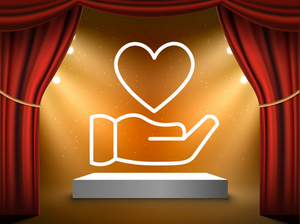BWW Blog: The Stage and Social Change
We can use art to create a culture that combats unjust power.

You turn on Fox News and see a reporter in Times Square holding a poster with bathroom symbols of a man, a woman, and a gender-neutral individual. The reporter begins to describe the gender-neutral symbol as being a man on top, and a woman on the bottom. He then interviews tourists about what they think this "strange figure" represents. After hearing tourists' responses, he states that Illinois State University is going to relabel their family bathrooms as all gender bathrooms. He then makes a comment that "this will be ridiculous how they try to implement this" and laughs off his "confusion".
We see these moments too often in today's media. News outlets, political campaigns, and trending social media posts frequently misinterpret or disrespect topics concerning gender, sexuality, and race. In wake of the Me Too Movement, LGBT activism, and the Black Lives Matter movement, we have seen people take a stand against intolerance. It is time for the performing arts to join these brave individuals in fighting for acceptance and equality. However, this does not always have to be achieved through a heart-wrenching dramatic musical, such as Fun Home, or a political play like What the Constitution Means to Me. These are undoubtedly incredible genres of theatre that raise awareness for social dilemmas, but other genres can achieve the same goals. Theatre can connect audiences and ignite social change simply through humor and the recognition of faults in humanity.
When I took a first-year seminar titled Culture and Power at the University of Pennsylvania, I learned about ideological state apparatuses, which are non-government institutions that inherently reinforce a society's ideology. For instance, education systems and media platforms are ideological state apparatuses that create socioeconomic, racial, and gender inequalities that elite capitalist politicians ignore. However, with art we can draw attention to discriminatory ideology and prompt change.
Satire and comedy are two genres that have the ability to address societal issues and demonstrate how we fall subject to centuries-old ideology. The entire purpose of satire is to make audiences laugh at their own mistakes as well as the mistakes of society. Audiences realize which aspects of their personality they must revise and what social movements to stand behind to better society. One example is the musical Urinetown that satirizes government power, business greed, and capitalism. This hilarious musical is rather unrealistic and the humor is dark, yet it exaggerates the degree that businessmen crave money and can cause corruption in the government. Audiences walk away with songs stuck in their head, but they also realize they must rethink who they vote for, where they spend their money, and if they live an eco-friendly lifestyle. Pure comedy without satire also highlights flaws in humanity. For instance, Broadway's The Prom is a musical comedy that addresses the struggles of LGBT youths and adults while incorporating big dance numbers and jokes. A musical comedy such as The Prom attracts a wide audience of many ages since many people buying a ticket to a show want to walk out of the theatre inspired and cheerful. Furthermore, younger audiences are attracted to stories about people their own age grappling with similar issues of becoming an adult in the contemporary world. With such a wide audience, a greater variety of people can be exposed to new perspectives and persuaded to stand behind those whose rights are being taken away.
With the 2020 election on its way in November, it is essential that more art is created that will influence people to vote and garner attention towards racial, gender, and socioeconomic inequalities. Americans must recognize the implications of the decisions they will make when voting. We are not only voting for a president, but also senators and representatives who are essential to the policy making progress. The president also will have an influence on the roster of the Supreme Court which will affect rulings for years to come. If we want to gain acceptance and equality for everyone, we must put all our effort into convincing people to vote and recognize the flaws of the current federal government. Dramas are one method to get the word out, but satires and comedies will attract wider audiences that may have never been reached. We can use art to create a culture that combats unjust power.
Comments
Videos


